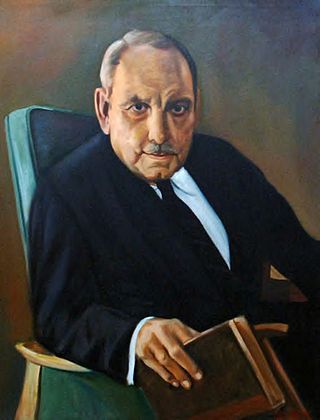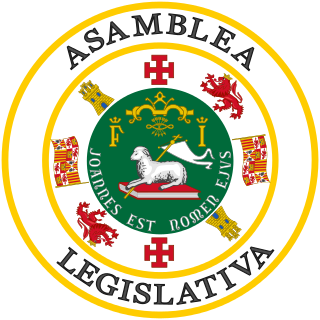Puerto Rican heraldry has no precise rules, because its evolution has been according to the ideas and prevailing customs of every time of its history.
The Coat of Arms was granted by Ferdinand II of Aragon to the island of San Juan. [1]
Puerto Rican heraldry has no precise rules, because its evolution has been according to the ideas and prevailing customs of every time of its history.
The Coat of Arms was granted by Ferdinand II of Aragon to the island of San Juan. [1]
There are several seals of the different sections of the Puerto Rican government.

Puerto Rico, officially the Commonwealth of Puerto Rico, is a Caribbean island and unincorporated territory of the United States with official Commonwealth status. It is located in the northeast Caribbean Sea, approximately 1,000 miles (1,600 km) southeast of Miami, Florida, between the Dominican Republic and the U.S. Virgin Islands, and includes the eponymous main island and several smaller islands, such as Mona, Culebra, and Vieques. It has roughly 3.2 million residents, and its capital and most populous city is San Juan. Spanish and English are the official languages of the executive branch of government, though Spanish predominates.

The politics of Puerto Rico take place in the framework of a democratic republic form of government that is under the jurisdiction and sovereignty of the United States Congress as an organized unincorporated territory. Since the 1898 invasion of Puerto Rico by the United States during the Spanish–American War, politics in Puerto Rico have been significantly shaped by its status as territory of the United States. The nature of Puerto Rico's political relationship with the United States is the subject of ongoing debate in Puerto Rico, in the United States, the United Nations and the international community, with all major political parties in the archipelago calling it a colonial relationship.

Don Luis Alberto Ferré Aguayo was a Puerto Rican engineer, industrialist, politician, philanthropist, and a patron of the arts. He was the governor of Puerto Rico from 1969 to 1973. He was the founder of the New Progressive Party, which advocates for Puerto Rico to become a state of the United States of America. He is a recipient of the Presidential Medal of Freedom.

Rafael Hernández Colón was a Puerto Rican politician who served as the governor of Puerto Rico from 1973 to 1977 and 1985 to 1993 for a total of three terms. An experienced politician, Hernández held the record for having been the youngest Governor of the Commonwealth of Puerto Rico to date, having won his first term at the age of 36. Hernández was also the person to have run for governor the most times, a total of five. During his terms as governor, Hernández Colón's administrations were known for trying to invigorate the Puerto Rican economy as well as for defending the political status quo of the island. He is also the second longest-serving Puerto Rico Governor with 12 years of service due to his three terms.

José Luis Alberto Muñoz Marín was a Puerto Rican journalist, politician, statesman and was the first elected governor of Puerto Rico, regarded as the "Architect of the Puerto Rico Commonwealth."

The Ponce massacre was an event that took place on Palm Sunday, March 21, 1937, in Ponce, Puerto Rico, when a peaceful civilian march turned into a police shooting in which 19 civilians and two policemen were killed, and more than 200 civilians wounded. None of the civilians were armed and most of the dead were reportedly shot in their backs. The march had been organized by the Puerto Rican Nationalist Party to commemorate the abolition of slavery in Puerto Rico by the governing Spanish National Assembly in 1873, and to protest the U.S. government's imprisonment of the Party's leader, Pedro Albizu Campos, on sedition charges.

Antonio Rafael Barceló y Martínez was a Puerto Rican lawyer, businessman and the patriarch of what was to become one of Puerto Rico's most prominent political families. Barceló, who in 1917 became the first President of the Senate of Puerto Rico, played an instrumental role in the introduction and passage of legislation which permitted the realization of the School of Tropical Medicine and the construction of a Capitol building in Puerto Rico.

Jesús T. Piñero Jiménez was the first and only native Puerto Rican to be appointed governor of Puerto Rico by the Government of the United States.

Juan Antonio Corretjer Montes was a Puerto Rican poet, journalist and pro-independence political activist opposing United States rule in Puerto Rico.

The Nationalist Party of Puerto Rico is a Puerto Rican political party founded on September 17, 1922, in San Juan, Puerto Rico. Its primary goal is to work for Puerto Rico's independence. The Party's selection in 1930 of Pedro Albizu Campos as its president brought a radical change to the organization and its tactics.

Antonio Fernós Isern was the first Puerto Rican cardiologist and the longest serving Resident Commissioner of Puerto Rico in the United States Congress.

The Senate of Puerto Rico is the upper house of the Legislative Assembly of Puerto Rico, the territorial legislature of Puerto Rico. The Senate, together with the House of Representatives of Puerto Rico, control the legislative branch of the government of Puerto Rico.

The Legislative Assembly of Puerto Rico is the territorial legislature of the Commonwealth of Puerto Rico, responsible for the legislative branch of the government of Puerto Rico. The Assembly is a bicameral legislature consisting of an upper house, the Senate normally composed of 27 senators, and the lower house, the House of Representatives normally consisting of 51 representatives. Eleven members of each house are elected at-large rather than from a specific legislative district with all members being elected for a four-year term without term limits.

The coat of arms of Puerto Rico was first granted by the Spanish Crown on November 8, 1511, making it the oldest heraldic achievement still currently in use in the Americas. The territory was ceded by Spain to the United States in accordance to the peace treaty that ended the Spanish–American War in 1899, after which two interim arms were adopted briefly. A law was passed in 1905 that reestablished the historical armorial bearings as the arms of the territory. Then in 1976, after numerous investigations and amendments, the current version was adopted.

Elections in Puerto Rico are guaranteed by Article Six of the Constitution of Puerto Rico and the Electoral Code of Puerto Rico for the 21st Century Act. All processes are overseen and managed in whole by the Puerto Rico State Elections Commission; an autonomous agency of the executive branch of the government of Puerto Rico.

Bolívar Pagán Lucca was a Puerto Rican historian, journalist, and politician.

Lesbian, gay, bisexual, transgender (LGBT) persons in Puerto Rico have almost the same protections and rights as heterosexual individuals. Public discussion and debate about sexual orientation and gender identity issues has increased, and some legal changes have been made. Supporters and opponents of legislation protecting the rights of LGBT persons can be found in both of the major political parties. Public opposition still exists due, in large part, to the strong influence of the Roman Catholic Church, as well as socially conservative Protestants. Puerto Rico has a great influence on the legal rights of LGBT citizens. Same-sex marriage has been legal in the commonwealth since July 2015, after the U.S. Supreme Court ruled in the case of Obergefell v. Hodges that same-sex marriage bans are unconstitutional.

The history of Puerto Rico began with the settlement of the Ortoiroid people between 430 BC and AD 1000. At the time of Christopher Columbus's arrival in the New World in 1493, the dominant indigenous culture was that of the Taínos. The Taíno people's numbers went dangerously low during the later half of the 16th century because of new infectious diseases carried by Europeans, exploitation by Spanish settlers, and warfare.

The Popular Democratic Party is a political party in Puerto Rico that advocates to continue as a Commonwealth of the United States with self-governance. The party was founded in 1938 by dissidents from the Puerto Rican Liberal Party and the Unionist Party and originally promoted policies on the center-left. In recent years, however, its leaders have described the party as centrist.

Movimiento Unión Soberanista (MUS) was a Puerto Rican political party. The party was founded in October 2010 in the city of Caguas, Puerto Rico.